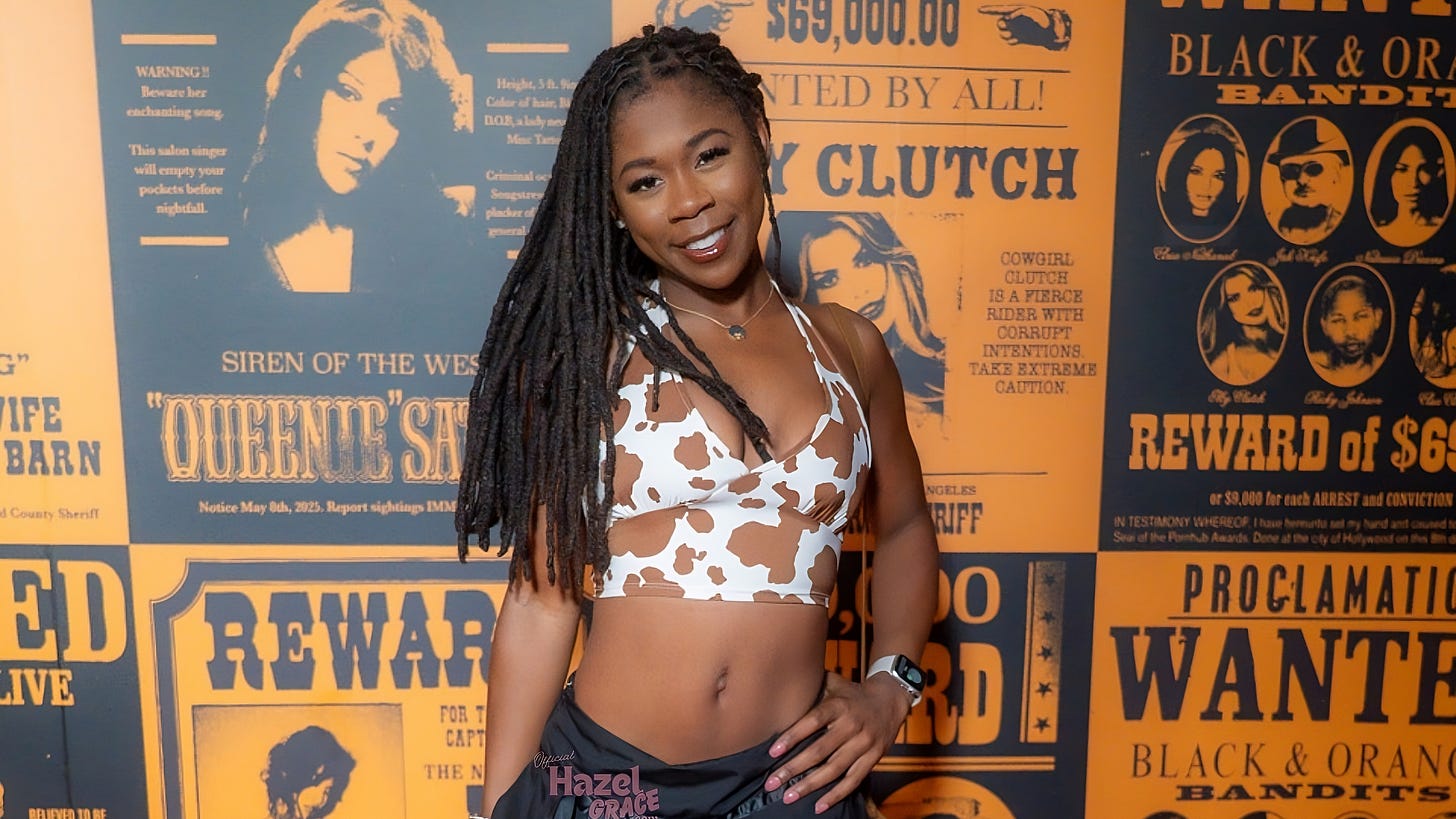Episode Summary
Ever since he came back into office, Donald Trump has messed up a lot of things. The judiciary, the budget, federal employees, foreign policy, you name it. But we can’t forget that America’s economic, political, and religious systems were already failing a lot of people long before he ever came on the scene. That’s especially true for younger Americans who face skyrocketing college tuition, an inscrutable job market, and relationship expectations that are no longer matching reality.
Some of them are dropping out of a rigged system, but others of them, like our guest on today’s episode, are thinking outside of the box.
Hazel Grace was raised as a conservative Christian in Alabama, but she walked away from all that to become an adult media executive and performer, as well as a political activist. Her journey challenges a lot of assumptions, not only about adult media, but also about who is allowed to participate in politics and media, and why.
Growing up in the Bible Belt, Grace was taught to be grateful for the bare minimum rather than expecting better. But rather than give up, Grace began crafting a new life on her own terms, rooted in honesty, autonomy, and openness. Her work today represents a fusion of personal liberation and social critique, a rejection of both religious conformity and economic exploitation.
Several years into her career now, Grace leads InMelanin, a production company and community that promotes women of color in adult media. She’s also an advocate for civil liberties and privacy through her Porn Over Party initiative.
Those are just some of the things we talk about in our very wide-ranging conversation. We also discuss her experience as a Southern girl who was skeptical of religion, and the difficulty that many black women encounter trying to earn a living in adult media. And perhaps most interestingly, we also discuss why she still identifies as a Republican, even though she can't stand Donald Trump.
The video of our conversation is available, the transcript is below.
Related Content
As social stigmas fade, more women are coming out as bisexual
Why gay Republicans helped build a political party that hates LGBT people
Young Republicans can’t get a date — or a clue as to why
Society still stigmatizes women more than men for having casual sex
How a retired porn star is helping her male fans understand themselves better
A brief history of the world’s oldest profession
MAGA is becoming a sexual fetish, no really
Tolerance is winning, even though it might seem otherwise
Audio Chapters
00:00 — Introduction
11:06 — Why Christianity wasn’t a good fit
17:06 — Transition to the adult industry
(Sections below are for paid subscribers only)
24:04 — Open relationship dynamics
26:39 — Who’s being exploited, performers or employees?
29:18 — Challenges faced by black women in adult media
38:25 — Building up InMelanin
44:16 — Helping Republicans realize their party hates porn
50:53 — The perils of being an anti-Trump Republican
59:25 — Conclusion
Audio Transcript
The following is a machine-generated transcript of the audio that has not been proofed. It is provided for convenience purposes only.
MATTHEW SHEFFIELD: All right, well let's just maybe start off with giving people kind of a background of where you're from, where you grew up and all that stuff.
HAZEL GRACE: I grew up in Alabama Millbrook, Alabama, small town.
SHEFFIELD: What part of Alabama is that?
GRACE: Central Alabama. Yep. I grew up there. I graduated in 2016. I got married in 2018. When I graduated, I had gotten accepted into a couple of colleges in north Alabama. And ultimately decided as I was registering for registering for classes that that is not what I wanted to [00:04:00] do.
I, and even to this day, doing what I do and running my business and all that, like, I'm still this person of, like, I don't want to sign up for that amount of debt, not knowing how I'm going to be able to pay it off. And, and that point in 2016, the, the shine that was on top of college life had already been well, well gone for most people.
Like we had seen people join sign up for the American Dream and. End up with 50 to a hundred thousand dollars in student loans and not able to get a job in the field that they wanted at that time. The, that whole college boom, that it was dead at that point in 2016. And so a lot of us were making were, we were over that lure and we were making an educated decisions based on all that information, and I decided, yeah, I just don't think this is a good move. At that time, it wasn't that I didn't still want to go to school, I still wanted to go. I still wanted to major in political science. I still had major dreams of becoming a politician someday. I just did not want to struggle all the way through.
I just felt like, okay, I'll work, I'll start a job. I was serving, I was working at three different jobs and I'm just trying to figure out how I'm going to save up money. My first was to get a car, move into a place, and then start saving up money so that I could at least pay for, I don't know, my tuition, my books, something, because to take on all of that.
To me, just felt like I'm already starting at a loss. From a, a middle class to low class family in Millbrook, Alabama, I'm already starting at a loss to sign up for that much debt. In my opinion, I would always be working to pay off that debt. My life would never be mine. It would always be working towards this goal, and I never wanted to view life that way.
I always felt like, if I'm going to live, I want to live for myself. I want to do things that I want. I want to do things that make me happy. I want to do things that make me feel fulfilled. And I just couldn't see myself being fulfilled or feeling fulfilled knowing that I had that hanging over me. To me, money is a big thing and money is a big thing in this country.
And I just think a lot of people, when they think that it's for the greater good, which in, in a lot of cases it is, they tend to just brush that [00:06:00] off. And that's how so many people ended up with so much student debt to get to their prospective fields. And so, as during all that, I decide I'm just going to be a housewife.
I'm going to, work my three jobs until I can afford to go to college. I meet my husband—well, I had already known my husband but we started dating right after I graduated high school and we got married in 2018. He joined the military, the Marine Corps, later that year, and we moved to California together so that he could start his duty station at Camp Pendleton in Oceanside, California.
SHEFFIELD: North of San Diego. For those who don’t know.
GRACE: Yeah, San Diego. Sorry, San Diego. But yeah, I mean, growing up, growing up in Alabama, it was tough. It just felt like, okay, am I ever going to make it out of this? It's just one of those things where you're starting at the bottom and it feels nearly impossible to make it out. And it's also the Bible Belt and you're being told like, just be grateful for what you have.
Just be grateful for what you have. Just be grateful for what you have. And it's like, yeah, but I could have more and I think I might deserve more. And so,
that, that, that, way of thinking in Alabama is not really accepted. People are very grateful for, for what they have, even if it's the bare minimum.
And the, I'm not no shame or shade on that at all whatsoever. You should be grateful for every little thing that you have, but that doesn't mean that you shouldn't want or expect more especially if you see that it's out there for you. And so, being
SHEFFIELD: that's also why you're political too
GRACE: yes
SHEFFIELD: You want to expand what's possible.
GRACE: For everyone.
SHEFFIELD: And you want people to think that they deserve more. And you are so right about that, that mentality, and it really has developed—unfortunately, as we've had more and more income inequality and things like that—that yeah, people just are like, well, I'm, all I can have is subsistence, survival.
That's all I, that's my goal is survival. And it's like, that's fine if you really think that, but you're better than that. You, you're better than [00:08:00] that and you deserve more.
GRACE: Yes. Because at the end of the day, you really have to think about it. If you're just surviving, just working your job and just surviving, who are you surviving for? Because the guy that owns that company is not coming into work every day and he's living his life while all of his little, these little worker bees just survive until they die.
And that's just not fair. Everyone should have a piece of living. And everyone should have a piece of working too. Like it's not, one of those. Magical scenarios where everyone gets to live a duty free life. We all have duties to each other ultimately. And so I just knew I'd never be okay with the status quo.
And that was then, it's gotten so much worse now. The way that corporations really rule everything, the corporate
overlords, they get to live their lives. They get to take vacations, they get to just do all the things that they want to do, and no one's telling them to be grateful for their employees and to make sure their employees are taken care of.
But as far as, growing up as a little black girl in Alabama, we're told to be grateful for every little thing that we have, even if at the end of the day we deserve that. And yeah, it's a very unfortunate way of thinking and it drills into people that they shouldn't expect more. And yeah, it just never worked for me 'cause
SHEFFIELD: Yeah. Well, you saw, you saw the
GRACE: Mm-hmm.
SHEFFIELD: All right, so, so you were doing three jobs like what kind of jobs were they?
GRACE: I was a server, a hostess, and a dishwasher. Cracker Barrel, Logan's Roadhouse. Sonic. Oh Charlie's.
SHEFFIELD: Oh wow. That's like the Holy Trinity of the south!
GRACE: Yeah.
SHEFFIELD: Okay. All right. Well, uh, and you know what, and, but I'm, and I'm sure you had a great time at those places,
GRACE: did. I'm a people person. Being a server was great. Like it was almost hard for me to move into this field because if
it wasn't for my husband and his like unwavering support, I would've just stayed. Just because being a server, I can make more money on tips. Because I love, I'm just a people person, so I had a lot of fun.
I love problem solving. Being a hostess and having people don't realize how [00:10:00] hard a hostess job is, it is actually quite difficult because you're dealing with. Four different sets of people you're dealing with, your servers, you're dealing with your your, your customers. You're also dealing with your kitchen.
And so keeping all of those things in mind in this big equation in your head so that the store doesn't get over, the servers don't get overwhelmed, the customers aren't unhappy and the kitchen isn't over overwhelmed as well. So yeah, like that's one of those jobs that now being a producer, I'm like, I was, I was learning.
I didn't go to college, but I've, I've had some experience with some almost impossible problem solving as a hostess.
SHEFFIELD: And so you are always a person who was trying to find the, the bigger picture and trying to look beyond yourself but also being introspective. So, but at the same time, as you said, you grew up in the Bible belt where, you, everybody, especially for, for black girls, like you were expected to go to church and do all the things that they say. And that was as I understand, how you grew up, but you, you kind of started to see the bigger picture in that regard as well.
GRACE: Yeah, definitely. Yes, for sure.
Why Christianity wasn't a good fit
GRACE: It wasn't like a one day, like a moment where I could remember where I was like, I no longer believe in any of this stuff. I'm no longer that person. I think it was a gradual thing for me starting as soon as I graduated high school, of like, okay, now it's up to me to get my, because I moved outta my parents' house two months after I graduated high school.
I moved into my own place and it was just one of those things of like, okay, am I going to take myself to church now every Sunday? Right? Because it's on me to be a Christian now. And I think I meant maybe I went maybe once or twice, and ultimately I'm talking to myself. And this was my thought process. My thought process was I'm working a job, I'm working two jobs at the time.
I'm working full as many hours as they will give me. And the, the, the trick with part-time jobs is they'll schedule you just an hour under that 40 hours so they don't have to make you a full-time employee. So I'm working two jobs and I'm still trying to get as much as I can hourly from those jobs and save up money to get a [00:12:00] car.
I grew up in a household where I think a lot of of black families have this experience where as soon as you turn 16, 17, 18, and you graduate, you're expected to then start paying bills in your parents' house. You're supposed to help. Right? And so the reason I moved out as soon as I graduated was because I felt like if I'm helping you to pay bills, how am I going to grow and get to a point where I can, move out, right?
I'm, I'm paying bills here that I can't really save up for that and save up for a car, save up for college, et cetera. And my purpose in doing that was. Alright, well if I'm going to be paying bills, I'm going to do it where I have some say in the house, or I'm going to do it where I can make my own rules. I can do all these things.
But in black culture, you can pay rent. Doesn't mean that I'm still your mom. You still have to listen to me. You still have to do what I say. You still have to, and to me, not going to work for me if, if I'm working and I'm paying bills, I'm an adult in this house at this point. And so I decided I'm going to move into my own place.
I'm still paying bills, so I still have to pay rent. And now I'm saving up for my car and I'm saving up for college. And I'm like, this is a lot on me. I'm getting paid 7 25 an hour at a job that should be paying far more. I'm working two jobs. I can still barely cover my rent and save up for a car and make sure I have food and all that stuff.
On top of that, to get to and from work, I have to give people gas money to take me to work and to pick me up from work. because Uber wasn't a thing at the time and so it was just, it felt like I'm barely getting paid. I. Anything, and I've gotta spread that out as far as I can get it. As well as saving up.
And so it really came down to having this conversation with myself of, I can still have a relationship with religion or with God and have my own relationship because if it's the God that I think, and it's the God that I want to love and look up to you, he's not going to judge me for doing what I need to do and working on Sundays instead of coming in to spend a few hours, at church.
Because, and at that point, at that moment is when I started to paint my own picture. I was like, oh, well if I can, if I, if this is the God that I want, right? Because God is who you [00:14:00] believe that he is, and it's the person that you have a relationship and a connection with, if that's the case. Then, oh, then this isn't, doesn't have to be the exact same way that they do it.
And this doesn't have to be the, I can have my own relationship with God, which I've been told that growing up. But, the way they do it, they're like, you can have your own relationship, but it's supposed to be this way, this way, this way. You're supposed to act this way, this way, this way. It's like, but you
told me he was my best friend.
My best friend's supposed to let me act how I want to act, blah, blah, blah. And so I started deconstructing that idea of, of what their idea of it is. And, okay, what is my idea of this person going to be? And even from that, and that was a, a, a heavy, a, a heavy, heavy on my heart for a while.
And so from 18 to 19 to 20, I'm going through that process of deconstructing and reconstructing what God is to me. And it just started to die off even more because again, I'm an adult now. I'm starting to see all of this ha just havoc and chaos in the world. And to think that there's a person out there that's allowing all this to happen, and he's supposed to be the greatest, and he's supposed to be the best, but time after time, the Jews are persecuted.
The blacks are persecuted, the gays are persecuted. Anyone that's not like you was persecuted. This is not the person that you've explained to me as God. And so it just became this, like, all this was a lie. Let me just go on with my life and focus on what's real, what's in front of me, what I can prove, what I can move forward with to make my life better.
At the same time, again, I had reconstructed what my idea of God was and my idea of God was, as long as I'm being a good person, I'm not stealing. I'm not lying. I'm not cheating. I'm treating every person like family, which I still do to this day. I treat stranger. I would give them the shirt off my back if I am that person at my core.
That man will let me into heaven. Like, he's not going to care what I'm doing on a daily basis. He gave me free will for a reason. And so I had made that peace with myself. And then from there, just, as you see, it's like my whole idea of this has just evolved and evolved over time to where now I'm at this point where like, I don't claim to be a religious person.
I don't go to church. I don't I mean, there's not [00:16:00] really much more, that, that Christians do. I do all the other things. I donate to people and to charities. I give my time and my, my, grace to people. And of course, like I said, the no stealing, cheating, lying. And so that's the best that I can do to be a good Christian.
I don't think me altering everything else about myself is necessary, but that's what they tell you. And so at that point it was like, okay, I'm going to focus on what's real, what's right in front of me. But I must say like, even now to this day, if it gets really hard and like. I'm saying really hard, like I've been going through it for months.
I don't know what's going on. I'll, I'll say a prayer. I will say a prayer. I will acknowledge. I don't talk to you often. I know that you're always watching over me, blah, blah, blah, blah, blah. I, I just need someone to be by my side to get through this. because right now, I don't feel mentally strong enough to handle whatever it is I'm handling.
I'll say a little prayer and I'll move on. If my life starts to get better, I'll acknowledge like, oh my God, thanks. Thanks, bro. Like, but for me, religion as a, a concept and as a conversation, even for me, really stopped a year before I joined the industry.
Transition to the adult industry
GRACE: And I think I was able to really grow my confidence in who I am as a person and all those things, because I didn't put that at the forefront of my personality.
because then in the South, being a Christian is half the people's personality. It's just all that they are. It's all they can talk about it. You don't find yourself or find what you want and what you love and who you are. When you're following that roadmap, if that makes sense. ,
SHEFFIELD: So you mean that like they, they've sort of externalized their identity
GRACE: exactly. Exactly. And I, I gotta say, I do find, vanilla people to be quite boring, whether that's monogamous or extremely religious. Their lifestyles are just quite boring. They, they go to work, they go to school, they pay their bills. They like, where, what, what part of that is for you? What part of that makes you happy? What part of that is
SHEFFIELD: What are
you thinking?
GRACE: exactly. Exactly,
SHEFFIELD: feeling? Yeah.
GRACE: And so, yeah I [00:18:00] decided. This is, this is fake. It's not at all what it was explained to me as the people that are practicing it are very fake. It was just one of those things of I'm going to start living my life now and stop worrying about am I being a good Christian?
Am I being a good person? All that tied back to what I was taught in the Bible Belt. I need to quit trying to be that person. I'm never going to become who I'm supposed to be if I continue to try to fit their mold.














